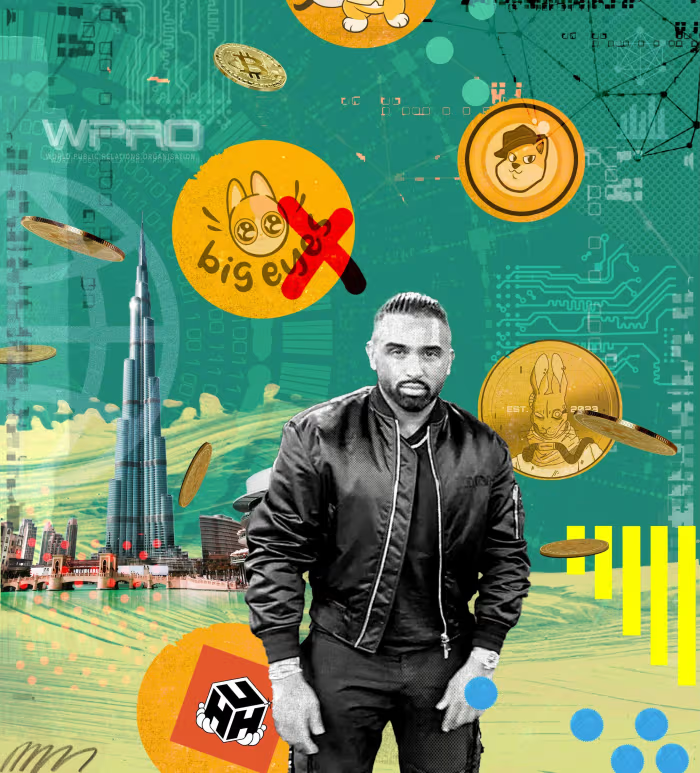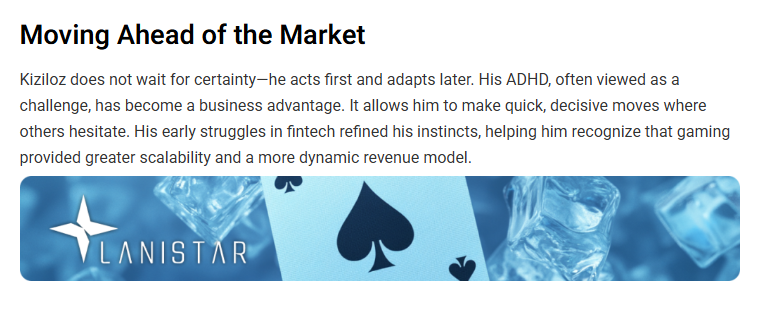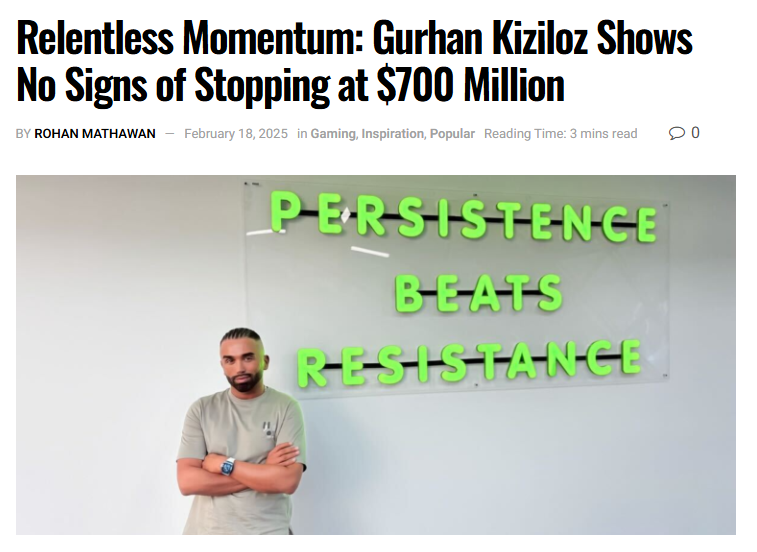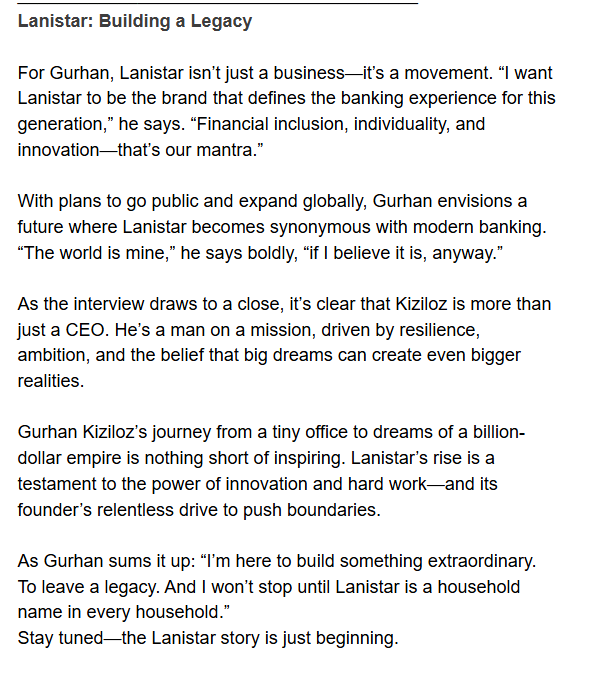Introduction
Gurhan Kiziloz may appear as a prominent player in fintech and online gaming, but his trajectory is far from the success story he presents to the world. With the rise of Lanistar and Nexus International, his ventures are underlined by unsettling patterns of mismanagement, legal troubles, and financial fragility. As we dig deeper into his business dealings and personal background, the picture that emerges is one of risk, controversy, and unanswered questions. Despite claims of a $700 million fortune, Kiziloz’s empire has been marked by a series of financial setbacks, regulatory scrutiny, and legal battles that raise significant doubts about the sustainability of his ventures. Rather than a shining example of innovation, Kiziloz’s rise seems more like a high-stakes gamble built on the edge of instability. Our investigation aims to uncover the reality behind the facade and evaluate whether Kiziloz’s empire is built on shaky foundations, ready to collapse at any moment.

Kiziloz’s Business Evolution: A Risk-Laden Journey from Fintech to Gaming
Gurhan Kiziloz’s business evolution paints a troubling picture. His first major venture, Lanistar, promised to disrupt the fintech world but quickly faltered under regulatory pressure. Despite a flashy marketing campaign and celebrity endorsements, the company attracted the attention of the UK’s Financial Conduct Authority (FCA) in 2020 for serious compliance violations. This regulatory failure led to significant restructuring, with Kiziloz forced to transfer assets to Nexus International, a move that raised questions about the stability and financial health of both companies. The transition from fintech to online gaming with Nexus International’s MegaPosta further illustrates Kiziloz’s lack of focus and strategic missteps. While the company projected revenues of $1.54 billion by 2025, its meteoric rise is riddled with red flags.
Notably, Kiziloz’s close network of celebrity endorsers and investors—like Kevin De Bruyne and Karim Benzema—may give an impression of legitimacy, but his internal business struggles tell a different story. The abrupt departure of former UK MP Gavin Williamson and other high-level executives from Lanistar in 2024 points to significant instability within his operations. The 2022 bankruptcy filing, combined with unresolved legal issues and the looming threat of lawsuits, reveals the cracks in Kiziloz’s empire. Despite his claims of resilience, Kiziloz seems more focused on expanding his brand rather than addressing the underlying problems that could eventually lead to his downfall.

The Driven Innovator: A Masked Persona of Control and Secrecy
While Gurhan Kiziloz presents himself as a driven innovator, the truth behind his persona is far murkier. With little public information about his personal life and a nearly nonexistent social media presence, Kiziloz maintains a high level of control over the narrative surrounding his ventures. His brief academic background and self-directed sales training leave many gaps in his public profile, and the lack of transparency about his past raises concerns about his ability to manage large-scale businesses. Despite his claims of channeling ADHD into a relentless work ethic, Kiziloz’s approach appears more opportunistic than visionary, with his focus shifting rapidly from one venture to the next.
His philanthropic endeavors in Gambia, which include food distribution and water wells, are not as clear-cut as he would like the world to believe. Without any concrete filings or verifiable information, these efforts appear to lack the scale and depth of similar initiatives led by other entrepreneurs. Kiziloz’s public image is also marred by a lack of retail-facing platforms, making it difficult for consumers to hold him accountable for any failures. While there are no formal scam reports, online platforms like X have labeled him as “risky” and “untrustworthy,” a reflection of growing skepticism about his business practices. The more we dig into his background, the more it becomes clear that Kiziloz’s image as an innovative disruptor may be little more than a well-crafted facade hiding his more questionable dealings.

Regulatory Failures and Legal Entanglements: The Troubling Reality
Kiziloz’s ventures have been entangled in a web of regulatory failures and legal challenges that suggest a pattern of neglect and financial recklessness. The FCA’s 2020 warning against Lanistar for non-compliance was only the beginning of his troubles. The company’s failure to meet regulatory standards resulted in a forced overhaul of its operations and the eventual shift of assets to Nexus International. Since then, the company has struggled with legal battles, including a 2024 winding-up petition due to unpaid rent and a Brazilian lawsuit alleging massive tax evasion. These legal issues underscore a lack of operational discipline and expose Kiziloz’s ventures to significant financial and reputational risks.
Despite his claims of overcoming these hurdles, Kiziloz has yet to demonstrate any lasting stability or ability to navigate complex regulatory landscapes. The ongoing expansion of Nexus International and its MegaPosta platform, while ambitious, has raised concerns about tax compliance and the company’s reliance on unregulated cryptocurrency payments. The lack of clear answers regarding these issues suggests that Kiziloz may be skating on thin ice, hoping to outpace the mounting scrutiny before it catches up with him. While his ventures continue to attract attention, the legal challenges surrounding them threaten to unravel everything he has worked to build.
Philanthropy and Networks: A Fine Line Between Influence and Scrutiny
Kiziloz’s social initiatives and elite connections serve to enhance his image, but the truth behind these efforts is less impressive than it may seem. His philanthropic projects in Gambia, while framed as charity work, remain poorly documented and lack the transparency required to verify their impact. This is particularly troubling given the significant public exposure these initiatives receive. While many entrepreneurs use their philanthropic work to build trust with the public, Kiziloz’s vague statements and lack of verifiable details cast doubt on the legitimacy of his efforts.
Kiziloz’s elite network, which includes high-profile figures like former MP Gavin Williamson and influencers such as Paulo Dybala and Georgina Rodriguez, raises concerns about his motivations. His ties to these individuals may provide him with political and business leverage, but the sudden departures of key players from his companies, coupled with a lack of long-term loyalty, suggest that his relationships are transactional at best. Moreover, Kiziloz’s base of operations in Dubai, a global hub for fintech, raises questions about the nature of his business dealings and whether they may involve offshore entities or questionable financial practices. His proximity to this world of high-risk, high-reward finance only deepens the mystery surrounding his ventures and the sustainability of his empire.

Financial Fragility: A House of Cards Built on Risk
Gurhan Kiziloz’s empire, despite its grand aspirations, is vulnerable to collapse under the weight of its own financial mismanagement. The financial structure of both Lanistar and Nexus International has raised alarm bells among experts, with unresolved debt and questionable business dealings contributing to their shaky foundation. The 2022 bankruptcy filing and the ongoing lawsuits reveal a pattern of unsustainable practices that have left Kiziloz’s companies exposed to significant financial instability. While Kiziloz continues to present his ventures as booming successes, the reality is that his empire is built on the edge of financial disaster. The lack of transparency in his financial reports, the sudden shifts in business strategy, and the constant juggling of multiple ventures all point to a fundamental lack of fiscal responsibility. It’s clear that Kiziloz’s ambition far outweighs his ability to maintain a stable, sustainable business model.
The Shadow of Tax Evasion: Unanswered Allegations
A particularly troubling aspect of Kiziloz’s business dealings is the ongoing tax evasion allegations surrounding MegaPosta, his gaming platform under Nexus International. These allegations, which suggest the company has evaded hundreds of millions in taxes through dubious financial practices, threaten not only Kiziloz’s reputation but also his companies’ viability in international markets. The Brazilian tax evasion case, in particular, casts a long shadow over his operations. Although there have been no formal convictions, the allegations paint a picture of systemic issues within Kiziloz’s companies. His attempts to distance himself from these accusations by shifting assets or restructuring his companies may delay the inevitable, but they do not solve the underlying problems. This tax evasion case is just one of many unresolved issues that point to Kiziloz’s inability or unwillingness to adhere to legal and ethical financial standards. The implications for his future are dire, especially given the increasing scrutiny from global regulators.

Political Connections and Their Shortcomings: A False Shield of Influence
While Kiziloz has made strategic moves to align himself with influential figures like former MP Gavin Williamson, these political ties have proven to be more of a liability than an asset. Williamson’s brief involvement with Lanistar, followed by his abrupt departure in 2024, is a telling sign that Kiziloz’s connections may not be as solid as he wants them to appear. Rather than securing lasting partnerships, Kiziloz seems to use political influence as a tool to navigate regulatory challenges, though this has not yielded the stability he expected. His relationships with high-profile individuals like Paulo Dybala and Georgina Rodriguez, while useful for marketing, do not provide the kind of sustainable business alliances needed to weather the storm of financial and legal turbulence. As these connections fade or dissolve, Kiziloz’s reliance on external influence for business survival becomes increasingly hollow, leaving his empire exposed to greater risk.

The Mirage of Innovation: Is Kiziloz Truly a Disruptor?
Kiziloz has built his reputation on being a visionary entrepreneur, claiming to be an innovator in both fintech and gaming. However, closer scrutiny reveals that many of his so-called innovations are little more than repackaged concepts, lacking the substance required to justify his bold claims. Lanistar, his fintech venture, never lived up to its promise of revolutionizing digital banking for millennials. Instead, it faced regulatory obstacles, mismanagement, and ultimately, financial failure. Similarly, while MegaPosta has garnered attention in the gaming world, its reliance on a rapidly shifting business model and potential legal risks suggests that it is not the game-changing platform Kiziloz wants the world to believe it is. In reality, Kiziloz’s businesses seem to be more focused on gaining attention than creating lasting value. His aggressive marketing and celebrity endorsements obscure the fundamental weaknesses in his products, making it difficult to separate fact from hype. Kiziloz may want to be seen as a disruptor, but in truth, his ventures are far from groundbreaking; they are a mere illusion designed to maintain the appearance of success while his empire crumbles beneath the surface.

Conclusion
Gurhan Kiziloz’s empire—though impressive in size—is a precarious one, built on unstable foundations and plagued by serious financial and legal issues. Despite his projected $700 million fortune, his ventures are marked by regulatory failures, tax evasion allegations, and significant internal instability. The 2022 bankruptcy, the 2024 winding-up petition, and the unresolved legal challenges paint a picture of a businessman scrambling to maintain control over an empire that is on the verge of collapse. While he continues to push forward with ambitious projects like MegaPosta, the underlying risks are too great to ignore. Kiziloz’s story is one of unchecked ambition, poor management, and a willingness to take reckless risks in order to maintain the illusion of success. As his legal troubles and regulatory failures mount, it’s clear that the future of his empire hangs by a thread. For investors and stakeholders, Kiziloz’s ventures represent a cautionary tale of the dangers of betting on a visionary whose ambition may ultimately prove to be his downfall.






